MAES News and Features

Two RARF projects funded in response to Highly Pathogenic Avian Influenza (HPAI) in livestock outbreaks
MAES has awarded $135,000 from the Rapid Agricultural Response Fund (RARF) to support two research projects in response to recent outbreaks of Highly Pathogenic Avian Influenza (HPAI) in livestock.
Led by multidisciplinary teams from the College of Veterinary Medicine and the College of Food, Agricultural and Natural Resource Sciences, along with Extension specialists, the projects are investigating how H5N1 influenza A virus spreads among livestock and potentially into poultry and the time required for dairy herds to produce virus-free milk, restore milk production levels, and eliminate H5N1.
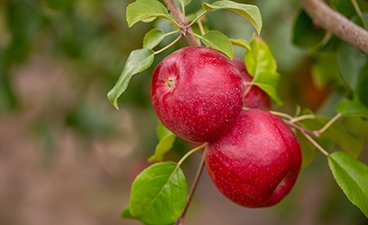
Plant a Triumph® Apple Tree this Spring
With its exceptional apple scab tolerance, delightful flavor, and ease of cultivation, Triumph is the perfect addition to any backyard or home orchard.
Triumph® apples have a pleasantly tart flavor, coupled with a well-balanced sweetness, making it great for fresh eating or adding a burst of flavor to your favorite recipes. Triumph® also boasts two genes that fight against the dreaded apple scab fungus, reducing the need for chemical sprays and making it an eco-friendly choice for organic growers and homeowners looking for lower maintenance trees.
Triumph® was released in 2021, and in the years since, licensees have grown out rootstocks and are now supplying trees to interested local garden centers. “Since Triumph® is such a new variety it may not be widely available just yet but check with your local nursery or garden center to see if they are planning to carry it,” explains Bedford. “Be sure to let them know that you’re interested in growing a Triumph® tree.”
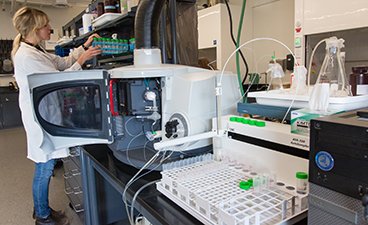
Leveraging the Expertise of the UMN Research Analytical Laboratory
As the year progresses and labs buzz with activity, the Research Analytical Laboratory (RAL) at the University of Minnesota is ready to assist researchers across a wide spectrum of disciplines.
Located on the St. Paul campus within the Crops Research Building, the facility offers comprehensive analytical services, specializing in soil, plant, and water samples. Whether you're delving into environmental studies, agricultural research, or any other scientific inquiry, RAL provides state-of-the-art equipment and expert assistance to ensure the success of your projects.
Explore RAL’s offerings, including but not limited to soil fertility analysis, plant nutrient assessments, and water quality testing.
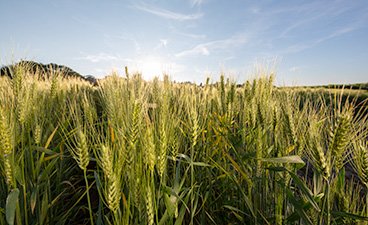
2023 University of Minnesota variety crop trial results available now
The Minnesota Agricultural Experiment Station (MAES) and the College of Food, Agricultural and Natural Resource Sciences (CFANS) have published the 2023 Minnesota Field Crop Trials. Visit varietytrials.umn.edu/2023 to see variety trials for 8 different Minnesota crops.
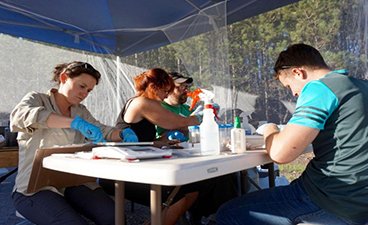
Research finds contaminants of emerging concern impact fish health in Minnesota waters
Researchers from the University of Minnesota and the Grand Portage Band of Lake Superior Chippewa discovered fish from 18 out of 19 testing sites in northern Minnesota contained contaminants of emerging concern (CECs) such as pharmaceuticals, hormones and personal care products. This research illustrates the ubiquity of pharmaceuticals in the environment and their potential impacts on fish — both in expected environments like wastewater but also in more surprising places, like undeveloped lakes.
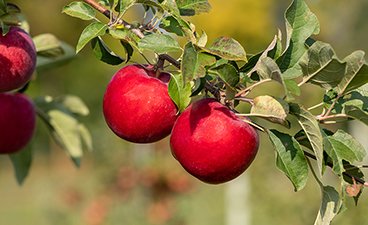
U of M announces Kudos™ brand MN33 variety apples, 29th apple release in program history
The University of Minnesota apple breeding program announces its 29th apple release: the MN33 variety, which will be sold under the brand name Kudos™.
Kudos™ is a beautiful red apple with a unique combination of traits including an excellent crisp, juicy texture and a sweet, well balanced flavor with occasional tropical overtones. It was developed by crossing the U of M hits Honeycrisp and Zestar!®, making it a sibling of the popular SweeTango® apple.
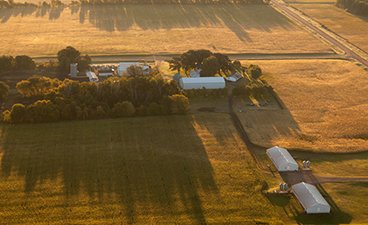
MAES Announces FY24/25 Rapid Agricultural Response Fund Project Awards
The Minnesota Agricultural Experiment Station (MAES) at the University of Minnesota has awarded approximately $2.6 million from the Rapid Agricultural response Fund (RARF) to 13 research projects that will help protect Minnesota’s agricultural sector from current and emerging threats.
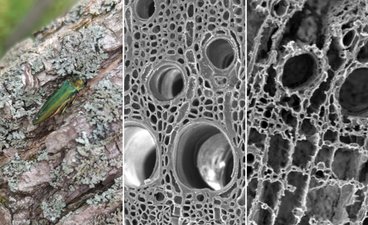
Fungi contribute to loss of structural strength in trees attacked by emerald ash borer
Since emerald ash borer (EAB) was first detected in North America in 2002, the invasive beetle has killed hundreds of millions of mature ash trees. After an attack, branches and trunks weaken and the trees become more likely to fall. Though this degradation has historically been attributed to damage from the beetles, new research from the University of Minnesota confirms that fungi play a significant role in the process.
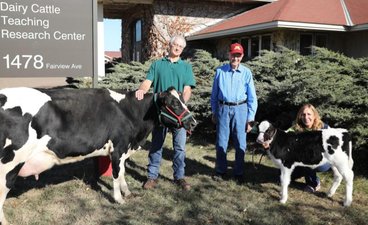
Unique herd of U of M Holsteins can help reduce mastitis in dairy cows
For almost 60 years, the University of Minnesota has maintained a one-of-a-kind herd of Holsteins. Scientists have now shown these unique “unselected” Holsteins offer considerable potential to help improve health traits of dairy cows. This includes a greater resistance to mastitis, a common infection in dairy cattle that significantly affects global milk production and can cause major health concerns for afflicted cows.
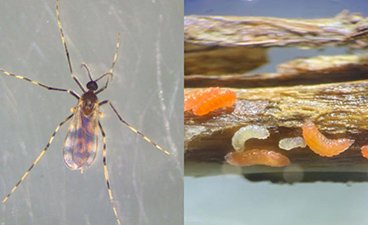
U of M students sequence genome of newly discovered soybean pest
University of Minnesota students conducted crucial genome sequencing for the newly discovered soybean gall midge — a pest that is threatening the soybean crop, one of the most widely cultivated and consumed throughout the world. This small fly has been found in major soybean-producing states in the Midwest, including Minnesota, Iowa, Nebraska, South Dakota and Missouri.
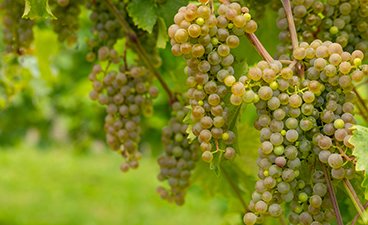
Clarion is newest cold-hardy wine grape from UMN
Grape growers and wine lovers take note: The University of Minnesota is releasing its sixth cold-hardy wine grape, Clarion.

2022 University of Minnesota variety crop trial results available now
The Minnesota Agricultural Experiment Station (MAES) and the College of Food, Agricultural and Natural Resource Sciences (CFANS) have published the 2022 Minnesota Field Crop Trials. Visit varietytrials.umn.edu/2022 to see variety trials for nine different Minnesota crops.
Crops included in this year’s trial include barley, canola, corn grain, corn silage, oat, soybean, spring wheat, winter rye, and winter wheat. Due to a delay in processing data, a full report for winter wheat will be available in mid-December.
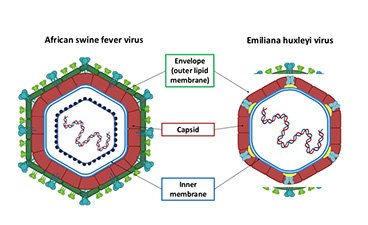
UMN-led research team discovers new surrogate virus assay for African Swine Fever virus
A team of researchers, led by University of Minnesota Professor Jerry Shurson, developed and validated a new surrogate virus assay for African Swine Fever virus (ASFV). This surrogate virus assay will allow researchers to better understand how ASFV survives in feed ingredients and to explore strategies to inactivate the virus and decontaminate facilities in the event of a potential ASFV contamination.
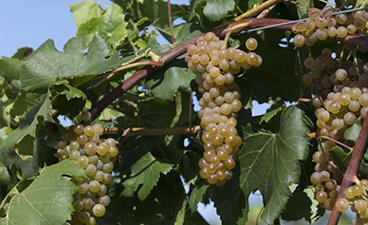
MN researchers to receive $10 million for development of disease-resistant grapes
A University of Minnesota-led team of researchers received the first round of funding from a $10 million grant awarded by the U.S. Department of Agriculture (USDA) to follow up on their work with VitisGen2, a multi-disciplinary, collaborative project focused on cultivating disease-resistant grapes that can be grown sustainably with reduced pesticide and fossil fuel use.
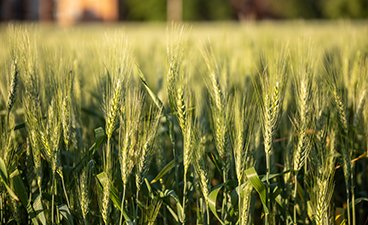
University of Minnesota Releases ‘MN-Rothsay’ Wheat
The University of Minnesota has released a new hard red spring wheat variety called ‘MN-Rothsay.’ MN-Rothsay features a good combination of yield, protein, and disease resistance and exceptional straw strength.

U of M research guides Minnesota's response to dicamba challenges
In the age of herbicide resistant weeds, the herbicide dicamba is a useful tool to Minnesota soybean farmers. With support from Minnesota’s Rapid Agricultural Response Fund, CFANS Professor Tim Griffis and his team have been conducting research to better measure and understand how dicamba moves across the landscape. Learn how that research has led to the development of best practices and guided state regulations.

U of M Outlines Visionary Agricultural Research Complex
The University of Minnesota continues to explore the development of an advanced agricultural research complex in Mower County, a bold vision for innovative research and workforce development in Minnesota to address an important market need helping farmers and industry meet this crucial moment in sustainable food production.
From farm to fork, this complex will serve as a state-of-the-art teaching and research hub that will propel vital discoveries and further establish Minnesota’s position as a global catalyst and leader in food and agriculture innovation. Read the full announcement.
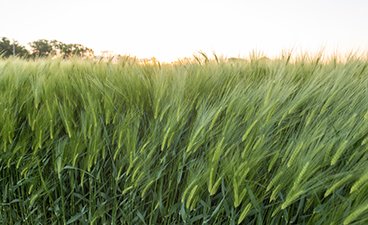
University of Minnesota Releases First-Ever Winter Barley Variety
Researchers from the University of Minnesota Department of Agronomy and Plant Genetics announce the release of a new six-row winter barley variety called MN-Equinox. Available for Fall 2022 planting, MN-Equinox is facultative, meaning it can be planted in either the spring or fall, giving growers flexibility in planning their rotations and adapting to weather conditions.

2021 University of Minnesota variety crop trial results available now
The Minnesota Agricultural Experiment Station (MAES) and the College of Food, Agricultural and Natural Resource Sciences (CFANS) have published the 2021 Minnesota Field Crop Trials. Visit varietytrials.umn.edu/2021 to see variety trials for 10 different Minnesota crops.

Minnesota Field Crop Trials website enables faster sharing of yield results
In an effort to get yield results from the fields to growers in a more timely fashion, the Minnesota Field Crop Trials now have a dedicated website to house all variety trial information. This new website is under development to allow researchers to share yield and other key field results with producers before the full publication is released. Visit varietytrials.umn.edu